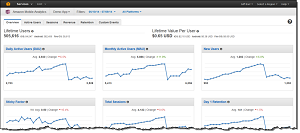News
Amazon Unveils New Mobile SDK and Services
- By David Ramel
- July 10, 2014
The Amazon Web Services Inc. (AWS) full-court press to attract mobile developers continued at the company's conference today in New York with the introduction of three new products, including an improved AWS Mobile SDK.
At the Amazon Web Services 2014 Summit, company exec Marco Argenti introduced the new mobile development kit and associated services for user authentication, data synchronization and analytics to track user behavior.
Meanwhile, Jeff Barr explored each of the new offerings in detail in a blog post. "We want to make it easier for you to build sophisticated cloud-powered applications for mobile devices!" he exclaimed. "User expectations are at an all-time high: They want to run your app on the device of their choice, they want it to be fast and efficient, and they want it to be secure."
To that end, he explained how the AWS Mobile SDK will work with the new Amazon Cognito and Amazon Mobile Analytics services to help mobile developers overcome challenges and meet user expectations.
The expanded SDK -- which comes in iOS and Android/Fire versions -- includes new features such as a new DynamoDB Object Mapper for iOS; S3 Transfer Manager; and enhancements to Objective-C and the Android and Fire OSes.
 [Click on image for larger view.]
Tracking mobile app usage and user behavior.
[Click on image for larger view.]
Tracking mobile app usage and user behavior.
(source: Amazon Web Services Inc.)
With the DynamoDB Object Mapper, developers can more easily map client-side classes to tables in the company's NoSQL DynamoDB database service. Object instances map directly to table items without the need to write transformation code.
The S3 Transfer Manager provides an API to asynchronously move files to and from the S3 object storage service. Developers can manage file transfers -- including pausing, resuming and canceling -- while optimizing performance and reliability, Barr said.
New enhancements related to the Android and Fire OSes enable mobile devices to reliably record data streams with Amazon Kinesis Recorder.
As announced last month in an AWS SDK version 2 preview, developers can now access the iOS SDK with the company's new Swift language. Also, the SDK now supports the CocoaPods dependency manager for Objective-C projects. It also provides support for Automatic Reference Counting (ARC) memory management and BFTask to allow chaining of asynchronous requests, instead of nesting them. Other changes have been made to more closely follow Objective-C best practices.
The second addition to AWS Mobile Services, Amazon Cognito, provides for the secure storage, management, and synchronization of user identities and data. A local data store can be created to cache user data and reconcile the data as apps go offline and back online so users can keep using the app the same way regardless of connectivity. App users can now start out as unauthenticated guests and later sign in via Amazon, Facebook or Google. Also, Cognito provides for security best practices.
Amazon Mobile Analytics automatically tracks user activities and provides data such as the number of users of an app and how much money it's making. The analytics service "can collect and process billions of events per day from millions of users," the company said in a statement. "It generates reports on active users, sessions, retention, in-application revenue, and custom events." Amazon said the service can provide usage reports within an hour of receiving app data, in contrast to other services that the company said might deliver such reports many hours later.
Together, the new products and services will simplify "heavy lifting" tasks such as hooking apps up with storage and database services, managing users, sending push notifications, and collecting usage data analytics, AWS said.
"With Amazon Cognito, Amazon Mobile Analytics, and the AWS Mobile SDK, developers are now able to focus more of their energy on what matters, the differentiated functionality of their app that attracts and retains end users," the company said.
Many more AWS announcements can be found on the summit's Web site.
About the Author
David Ramel is an editor and writer for Converge360.